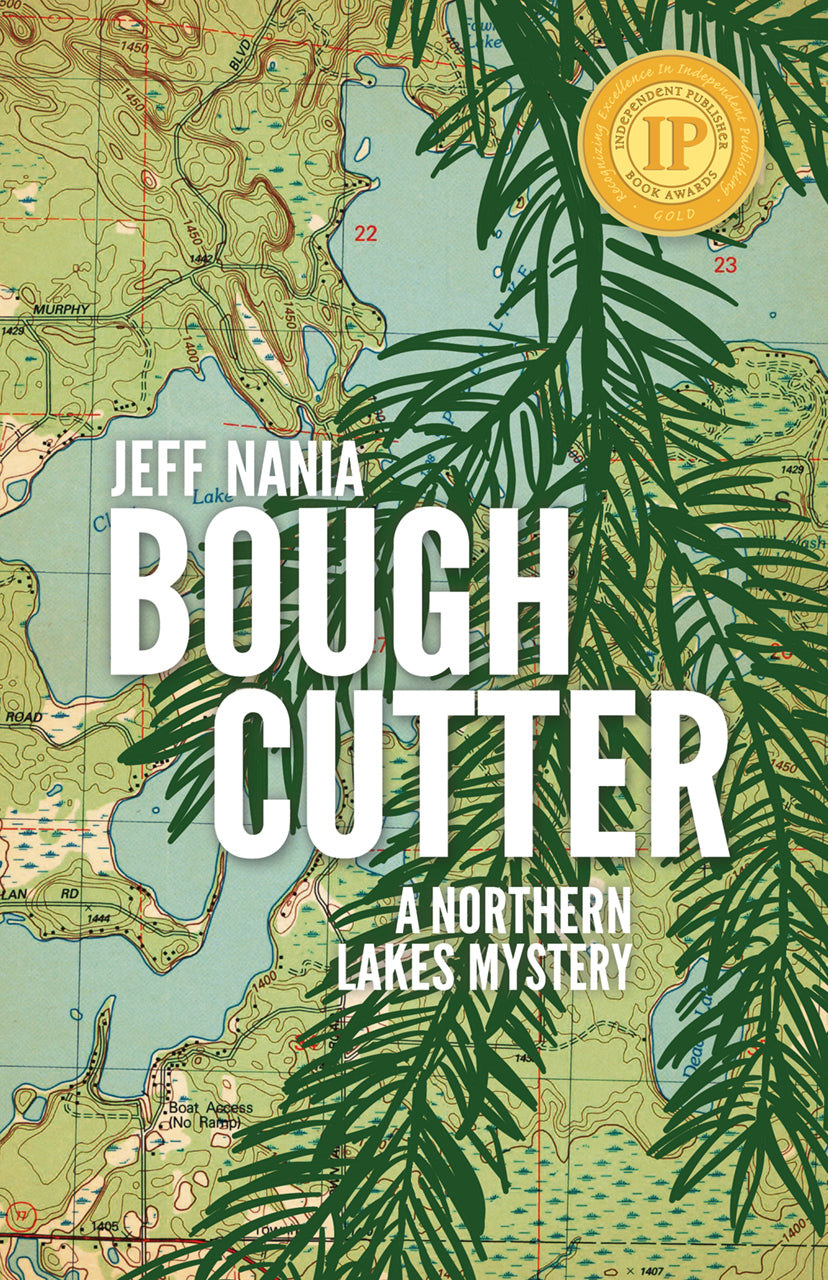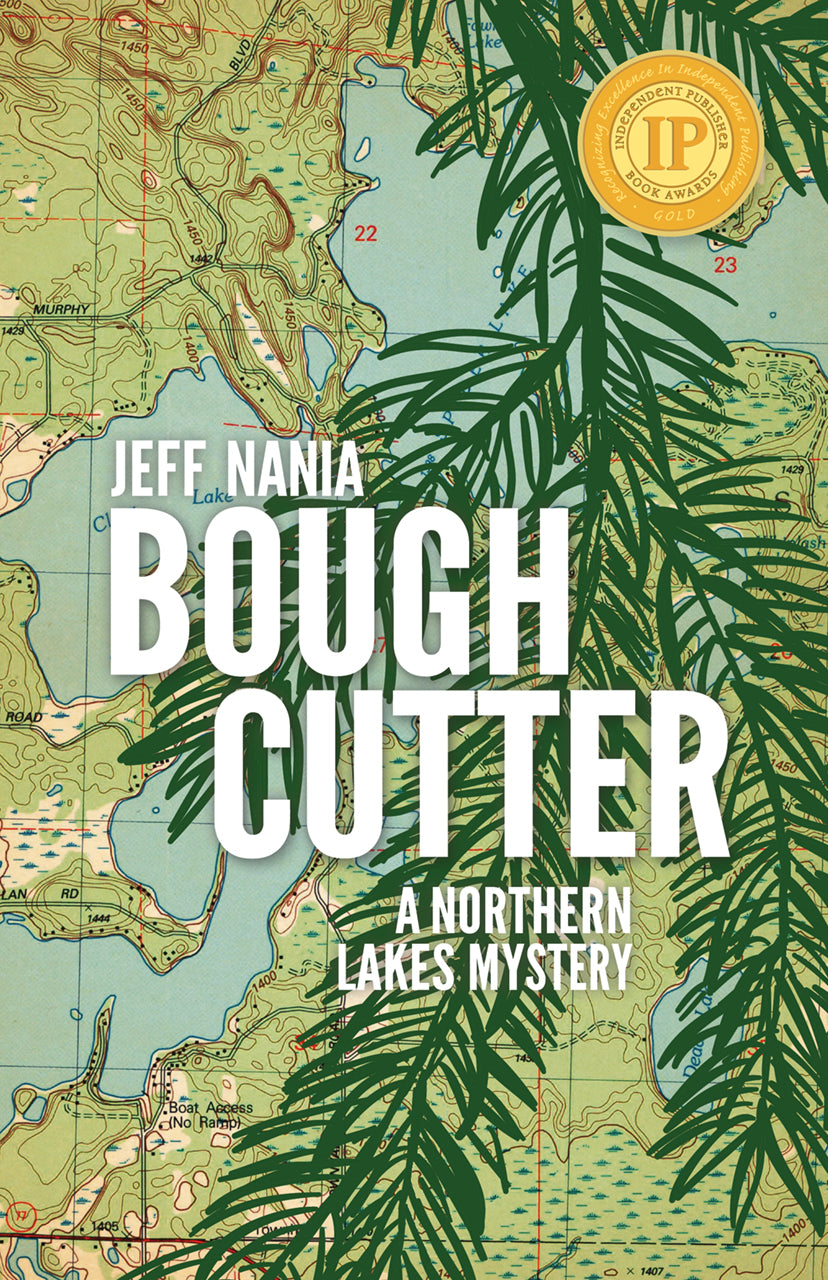Bough Cutter
Bough Cutter
Great Lakes Best Regional Fiction
⭐️⭐️⭐️⭐️⭐️ 491+ 5-Star Reviews
Couldn't load pickup availability
- Purchase the E-book/Audiobook
- Immediately Receive Email from Bookfunnel with Download Link
- Send to Preferred E-Reader and Enjoy
Print Books
- Purchase Print Book
- Receive confirmation of order
- Print books are shipped within 2 business days!
Synopsis
Synopsis
Just as Namekagon County sheriff John Cabrelli adjusts to his new job, a body is discovered in the woods—and he must race against time to unravel the case. Stressed relationships, public outcries for justice, and pressure from the media compound the situation. As the body count rises, he soon finds his greatest resource is the community itself.
This third book in the award-winning Northern Lakes Mystery series follows Figure Eight and Spider Lake. Bough Cutter keeps readers wondering who is on the right side of the law—a gripping tale of crime fiction!
Just as Namekagon County sheriff John Cabrelli adjusts to his new job, a body is discovered in the woods — and he must race against time to unravel the case when the lives of even more victims are claimed within the wilderness… A gripping tale of crime fiction!
Bough Cutter once again showcases author Jeff Nania's genuine flair for originality and the kind of narrative driven storytelling style that keeps the reader riveted from first page to last…
— Midwest Book Review
Book 3 in the Northern Lakes Mystery Series
If you would like printed books inscribed, add the title to your cart, click on "view cart" and indicate to whom in the text field.
Chapter 1 Look Inside
Chapter 1 Look Inside
Nearly every chair was full in the Musky Falls High School cafeteria. Merry chatter filled the room as friends, neighbors, and family members reacquainted after a busy summer season, waiting for the program to begin.The crowd quieted as a smiling woman walked up to the podium with a purposeful stride. Her blonde hair was in a ponytail, and she was wearing a bright green tie-dyed sweatshirt emblazoned with Northern Lakes Academy. She faced the room and introduced herself and her students.“Welcome. My name is Julie Carlson. I am the teacher at Northern Lakes Academy, and these,” she said with a sweeping gesture to the chairs behind her, “are my students.”“Tonight, they will present the research project they began last spring and will continue through the rest of this year. Each individual or small group designed and researched an aspect of the larger project based on firsthand, real-world circumstances. The individual and collective outcomes of the students’ research and investigation must lead to a potential solution they can implement by working with community partners. So, without further ado, let me turn the program over to the students.”Julie Carlson didn’t mention that besides being the lead and only teacher at Northern Lakes, she was also the love of my life.She smiled and stepped down and took a seat with the audience. A girl about fourteen years old took Julie’s place at the podium. She wore a sweatshirt two sizes too big and had purple hair on one side of her head and blonde on the other.“Welcome to the Northern Lakes presentation night. My name is Amber Lockridge. I am an eighth-grade student at the school, and this is my second year. Our school researches a local topic of interest three times a year. It can be any topic as long as it fits the guidelines we developed with Ms. Carlson.“Tonight, we are here to tell you what we have learned about the Wisconsin State fish, Esox masquinongy, better known as the muskellunge or musky. The muskellunge has become a source of significant revenue for the local economy. Recreational fishing brings in about 1.4 billion dollars in revenue annually to our state, and it is estimated that musky anglers generated 425 million dollars of that revenue. Just as importantly, muskies have played an important role in our history. My classmate Jacob will tell you about the history of the musky.”A boy about the same age as Amber took the podium. He was doing battle with his straight black hair to keep it out of his eyes.“My name is Jacob Fastfish or Gizhii-giigoonh. Long before the musky was the state fish of Wisconsin, actually long before Wisconsin was Wisconsin, and even before Wisconsin was known as Meskonsing, the Ojibwa called the musky the maashkinoozhe, meaning ‘ugly pike.’ Stories of the great fish, its tenacity and ferocious attitude, have accounted for countless legends and fish tales across the north country. According to written history, the world’s record musky was caught in Sawyer County, Wisconsin, in 1949 by a guy named Cal Johnson. The fish was sixty and one-eighth inches long, weighed over sixty-seven pounds, and was probably over twenty years old. It was caught on Lac Courte Oreilles, also known as Ottawa Lake by the Anishinaabe. It’s a five-thousand-acre body of water in northern Wisconsin and a perfect place for muskies. Now my classmate Lynsey will tell you more about muskies.”“Hi, my name is Lynsey Jones,” she started right off. “There are currently seven hundred seventy-five lakes, rivers, and streams in our state that have musky populations. It is thought that one acre of surface water will support one mature musky. Although depending on available food, they will range much further. They prefer a rocky bottom near heavy weeds to ambush prey. A musky will lay between twenty thousand and a quarter of a million eggs each year, depending on the health and size of the individual fish. When the eggs hatch, the fry are readily eaten by northern pike, large and smallmouth bass, perch, and sunfish. If a musky survives the first year, a hatchling will grow to eleven inches. The bigger they get, the fewer predators they have, and they can reach forty inches long by the age of nine. Now my classmate Danny will tell you about musky fishing.”“My name is Danny LeTroy. My dad is a musky fishing guide, and so is my grandpa. We take people out musky fishing all the time, but there is no guarantee the people we are guiding will catch a fish. Sometimes we don’t even see one. Muskies are the trickiest fish around, and even if you hook one, you are in for a fight. They will jump straight out of the water and try to shake the lure. Another trick they use is instead of pulling the line away from you, they will run at the boat and make the line go slack so you have to reel super fast to tighten up the line. They will dive under the boat and tangle the line in the prop and break it off. There is one trick you can use that will help you catch a musky. When people are casting lures for fish, they throw it out, reel it back in, and throw it out again. Every once in a while, they will see a musky follow their lure or swipe at it right next to the boat. Most of the time, they don’t strike. My dad and grandpa will then have their customers finish the cast, and when the lure is right next to the boat, they swirl it around in a figure-eight pattern. It gives you one more chance to get a fish. If a musky is following your bait, the figure eight will sometimes get them to strike. Once they hit, jerk the rod hard to set the hook and hold on, ’cause it’s going to get pretty exciting. My grandpa says catching a musky always depends on a combination of skill and luck. The bigger the fish is, the more luck you’ll need.”A figure eight. One more chance. This path that loops around and leads back into itself seems to be the one I follow. But even when I seem to be on a predictable path, events turn life upside down unpredictably.An old friend of mine, Manny Pinski, was the rabbi at a Jewish temple located in my old police beat. He had gotten word that I had some troubles and suggested we get together and talk.We met at a run-down park on the south side of the city. Broken bottles, used syringes, and trash littered the ground. Sitting on a bench together, I told Manny how I felt like my life was spiraling out of control. Plans for the future, or the next day for that matter, seemed to be thrown to the wind. He listened patiently and nodded.He addressed the situation in his clever way of combining a story into a lesson.“John Cabrelli, your trials and tribulations have given me inspiration for my next derasha. When my people next come together, I will tell them to go out and buy a notebook, spiral-bound, with one hundred pages—no, no, three hundred pages. Then I want them to get a pencil, a number two Ticonderoga—no, wait two pencils in case the lead breaks in one—and sit down and write the story of their life from this day forward. Every detail they can think of. You know why I want them to do this, John?”“No, Manny, I don’t.”“I want them to do this because God needs a good laugh, John.”Life had indeed become a series of unpredictable twists and turns—figure eights aplenty. I now found myself in a role that I had filled before, but not at my current location and place in life.
Share











